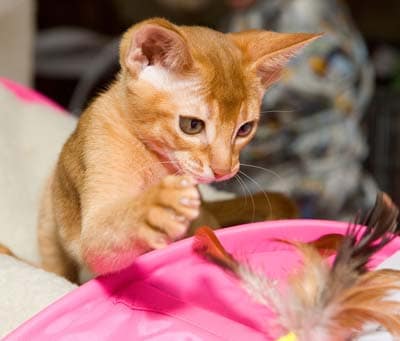
The nature of the cat: which one suits your lifestyle
Thinking about getting a cat? Cats are notoriously unpredictable, which can make it difficult to choose the right cat for you and your lifestyle. Although even purebred cats are more difficult to predict than dogs, you should still take into account the main character traits of the breeds when choosing the cat that suits you best. These recommendations will help you reduce the chance of unpleasant surprises and find the most suitable pet.
Contents
Kitten or adult cat?

Let’s face it – there’s nothing cuter than a tiny kitten, which is why it’s so hard to resist the temptation to bring such a baby home. Whether you should give in to this temptation depends on your patience. Kittens are a lot of fun, but also very difficult as they learn about the world around them and develop their personality noisily. If you do not have enough endurance to cope with the restlessness and mischief of a kitten for several months or even the first years, you may need to take an adult animal. They tend to be more calm. By about two years of age, a cat’s personality is fully formed, so you can be sure of what you get.
Family composition
To understand what kind of cat you need to look for, it is important to consider the composition of your family. For example, if you have small children, a kitten would not be the best option, unless you have a ton of patience and time to constantly protect a fragile kitten from grasping little hands. But adults also often dislike small children. It is important to look for a cat that will get along with your children and not be jealous of the attention you give them. It would be nice to take the kids with you to the shelter and let them play and interact with the animals to see how both sides get along with each other. This will help you decide which cat is right for your kids.
If you already have pets, they need to be taken into account too. Some cats prefer to be alone, while others get along well with other animals. Important
also consider how your current pets might react to a newbie. The Humane Society of the United States warns that if you have a large dog with a strong hunting instinct, it is not safe to bring a cat into the house. In addition, if you already have a cat, she may not like the new companion, she may be offended and misbehave, getting into fights, hide and seek, or urinate past the tray. And, of course, small animals such as birds, rodents or reptiles must be protected from the presence of a potential predator in their environment.
Lifestyle and living conditions
Think carefully about your lifestyle and the type of cat that suits you best. If you often leave the house, it is better to get a more independent cat who will not mind being alone for a long time. On the other hand, if you are a homebody, you may like a companionable pet who will sit on your lap, cuddle and follow you everywhere. Would you like a talkative cat who will constantly tell you how he’s feeling? How often do you receive guests? If so, an outgoing cat will probably enjoy your home more than a shy cat who experiences anxiety in the company of strangers.
Where you live matters too. Some animals adapt well to small spaces and being exclusively house cats, while others thrive in larger spaces that can be explored to relieve boredom and burn off energy.
Longhair vs Shorthair
Long-haired cats such as Himalayans or Maine Coons are certainly very nice to look at, but their coats require careful grooming. If you don’t have the time for daily brushing or the budget for occasional trips to the groomer, then a shorthair cat is your best bet. But before you ditch longhaired breeds, note that daily brushing can be an enjoyable pastime for you and your pet.
The main character traits of cat breeds

Once you have decided on the nature of the cat, it is time to learn more about the breed. On the Internet you can find a huge amount of information about cat breeds, but for starters, you can contact your local shelter. Keep in mind that there are significantly fewer purebred cat breeds than dogs, and there are fewer individual differences in character traits between breeds. However, cat breeds do have characteristics that can help you make the right decision. For example, Bengal cats and other exotic breeds such as Abyssinians are known to be very energetic and active, while Persians tend to be more calm and relaxed. Similarly, American Shorthairs usually don’t meow very much, unlike Siamese, who are known for being talkative.
Once you narrow down your choices, we recommend talking to people who have experience interacting with the breeds you are interested in. If you don’t know anyone personally, look for online forums or social media groups dedicated to specific breeds. We also recommend discussing the breed with a veterinarian who can talk about any genetic predispositions for diseases that sometimes occur in cats as a result of overbreeding.
breeder or shelter
Many purebred cats can be found in shelters, including kittens, if you know exactly which one.
breed you want. Contact your local shelter to find out what kind of cats they have. However, if you are planning to adopt a kitten from a breeder, then look for someone who is trustworthy. Your veterinarian can help you with this.
Purebred or outbred
Local pet shelters are sure to have plenty of mixed breed animals. Mixed-breed cats, also known as domestic or outbred cats, have many varieties that people tend to think of as special breeds, including tuxedos, tricolors, and tabbies, which are classified by color rather than by their parents. If you haven’t opted for a specific breed, then a mixed breed cat may have exactly the traits and temperament you’re looking for. Although mixed-breed cats are less predictable, you can learn all about a mixed breed cat simply by talking to the shelter workers who have spent a lot of time with her and know her well. An accommodation consultant will help you find a cat with the qualities you are looking for. Most shelters will certainly give you the opportunity to get to know the cat you are interested in and have a chat with it before deciding whether to adopt it. Another advantage of mixed breed cats is that they tend to be more resilient than purebreds due to their gene pool.
Compliance with these recommendations does not guarantee the complete absence of surprises. After all, cats are masters at keeping us on our toes, which is part of their allure. But if you come down to business knowing exactly what you’re looking for in an animal, you’re much more likely to get a great companion cat and a happy home.





